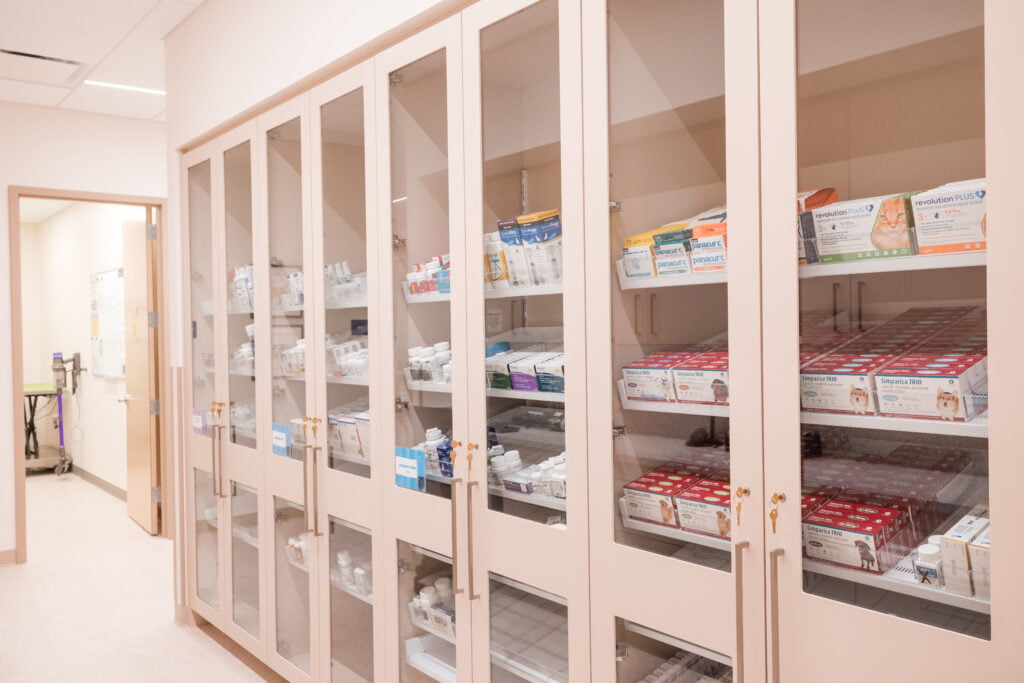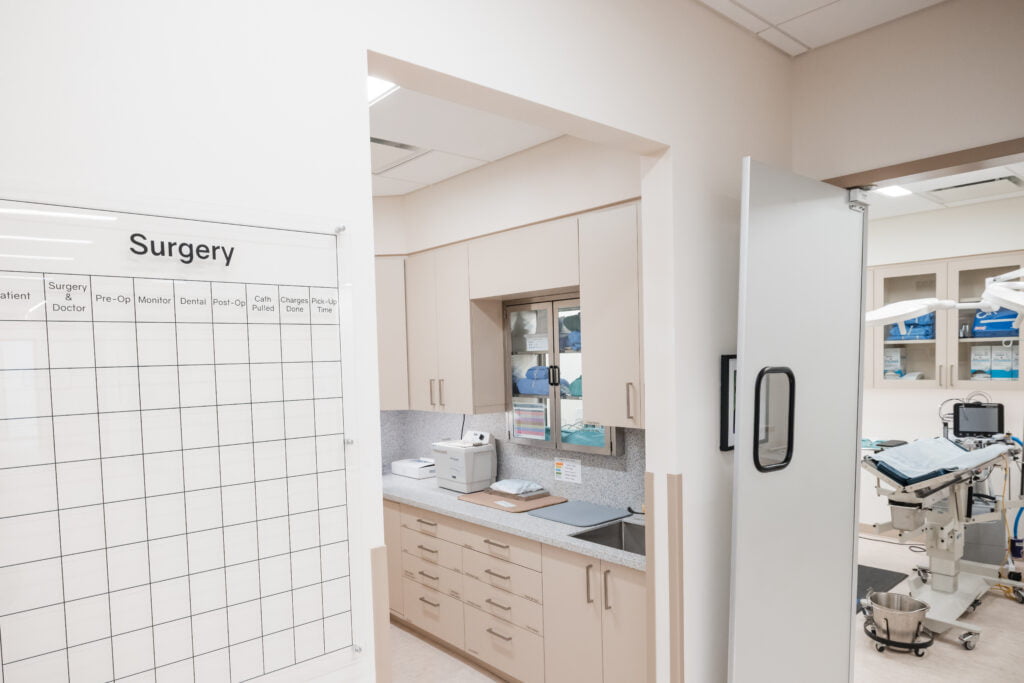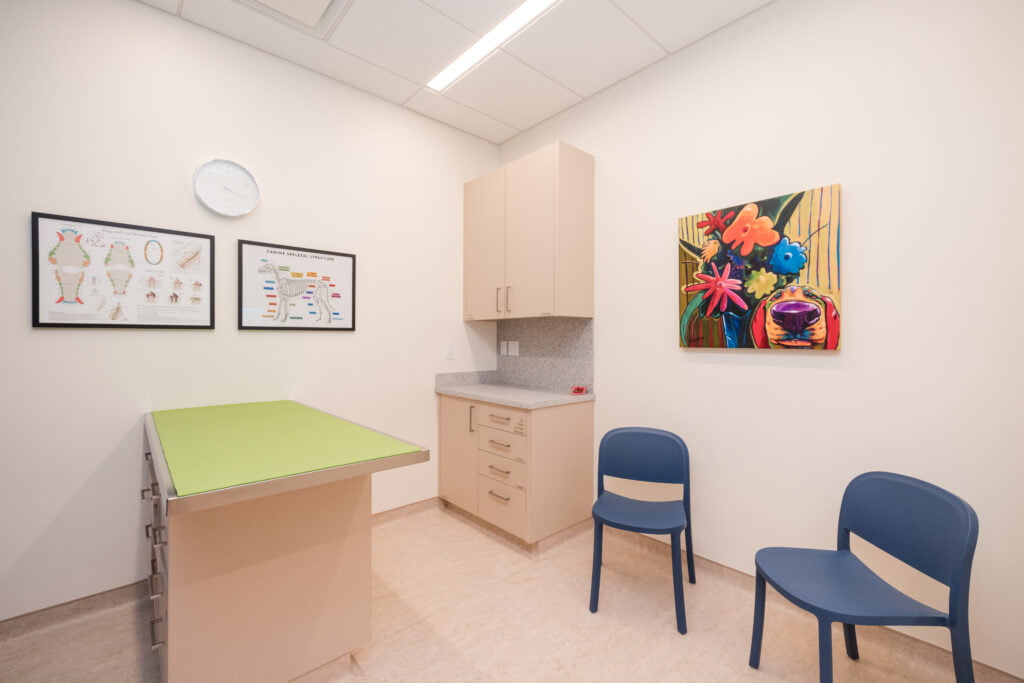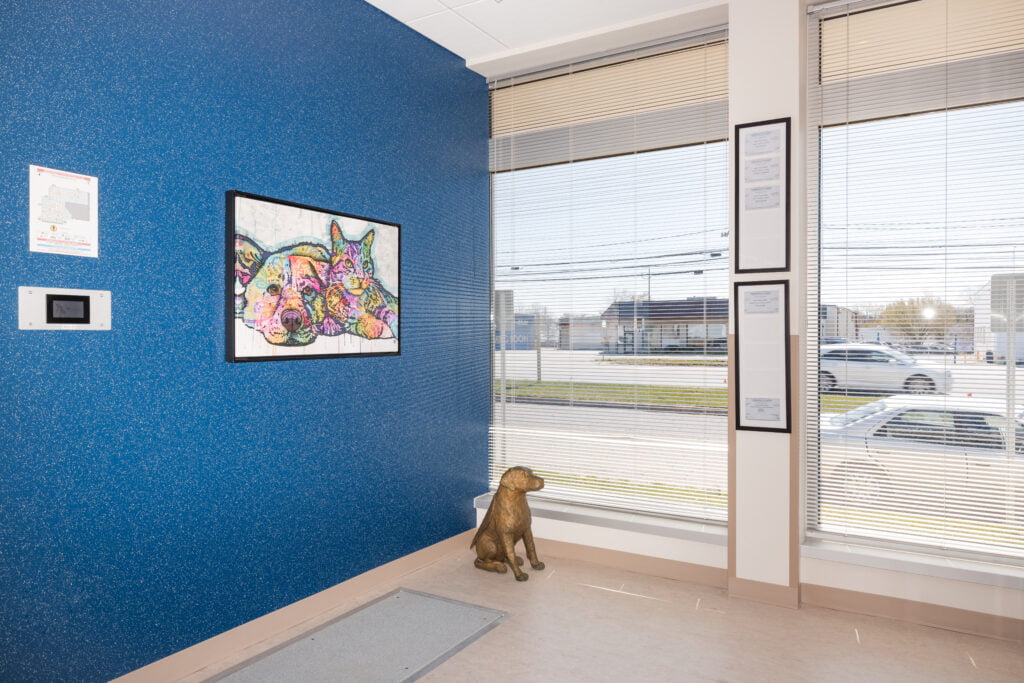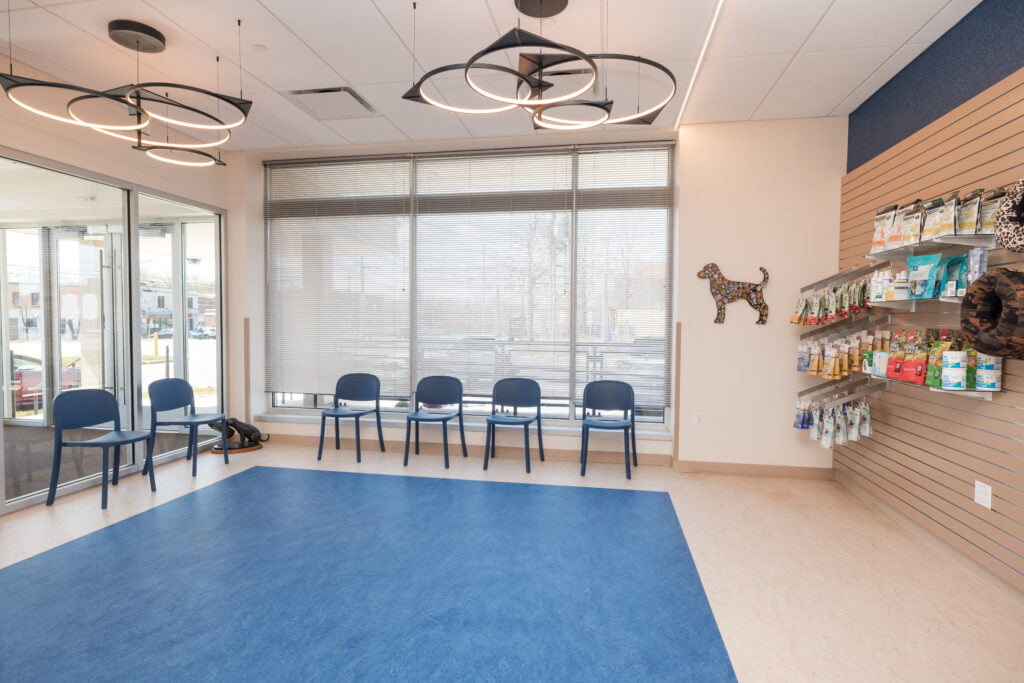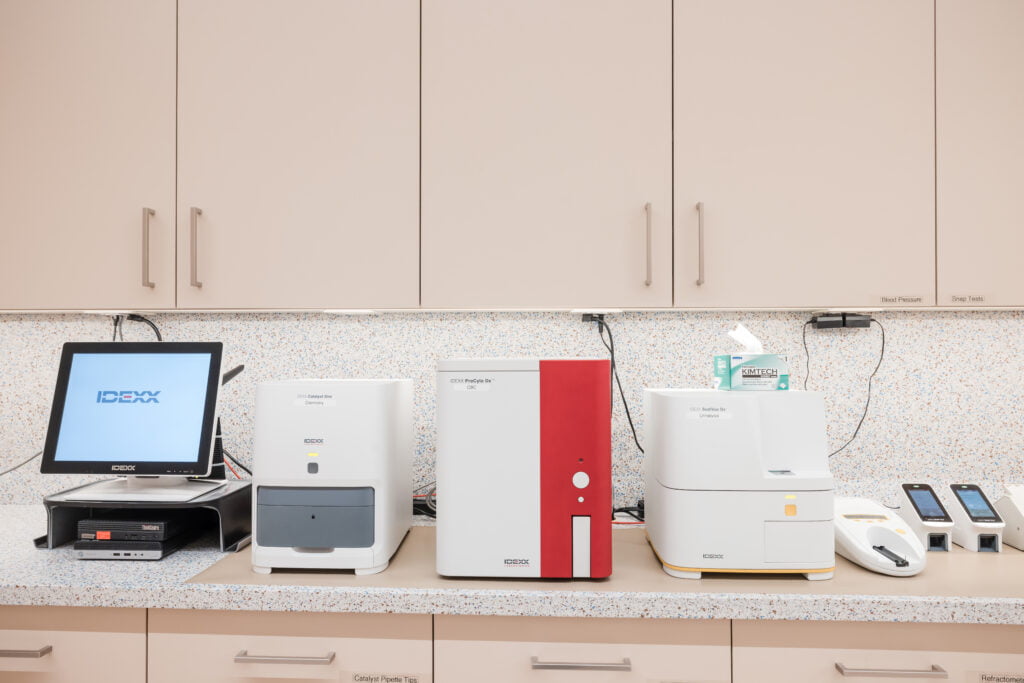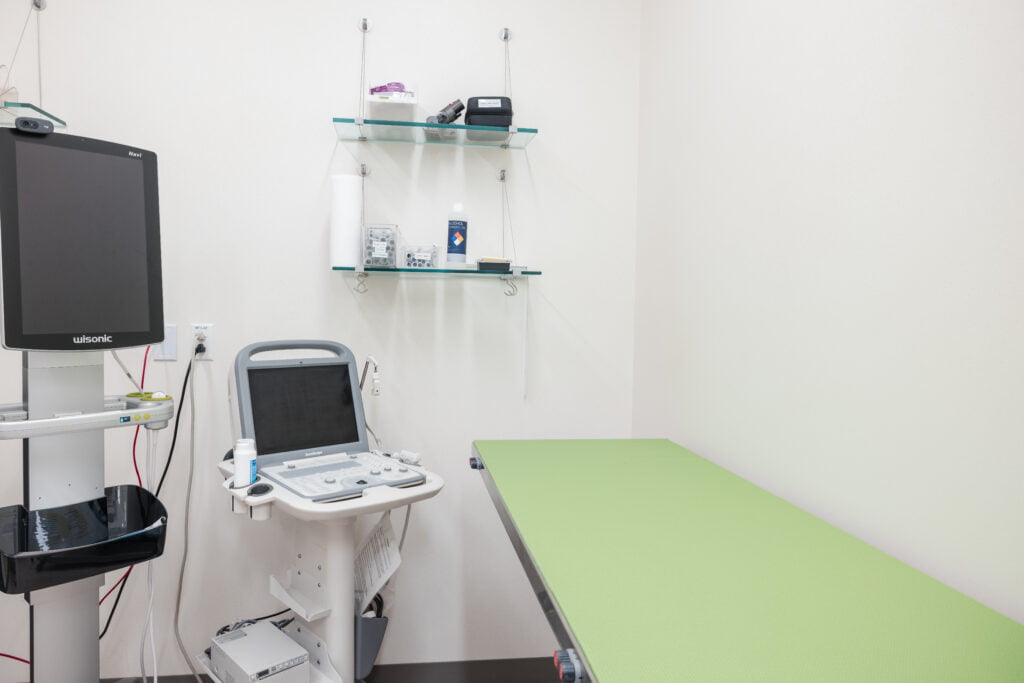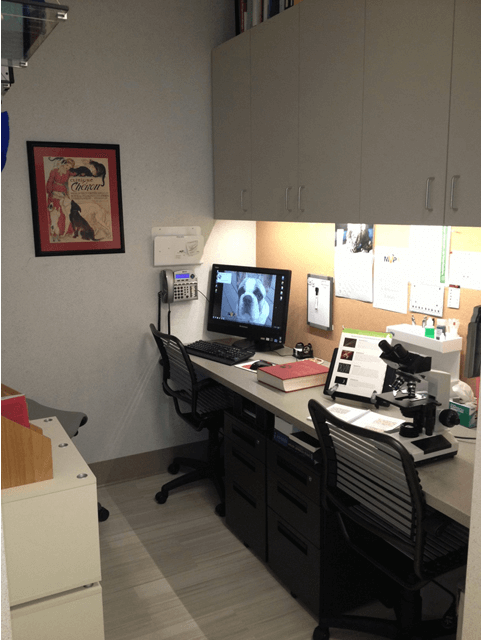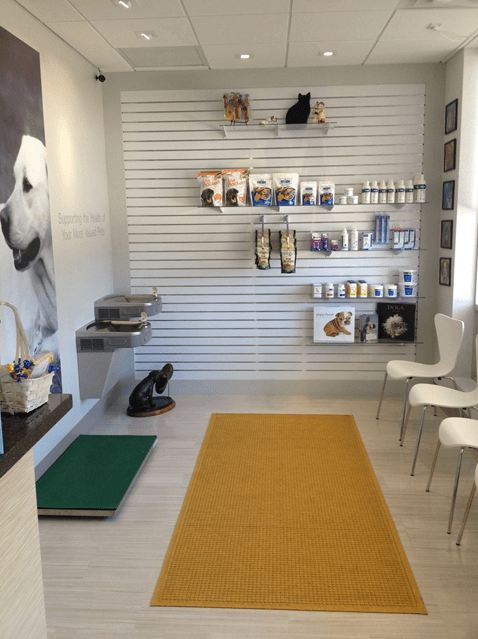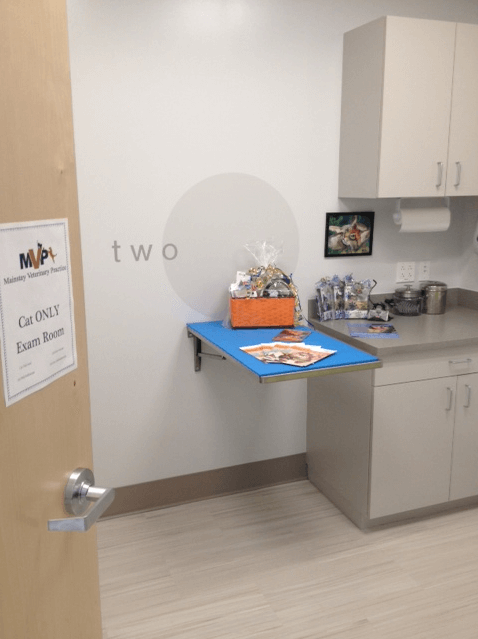Mainstay Veterinary Practice offers a wide range of veterinary services for our patients. Just a few of our wellness and preventive care services are listed below. For more information on these or other services, please call 703-280-4588.
Dentistry
One of the most common but also frequently overlooked health problems for companion animals is dental disease. By age 3, most pets have some degree of periodontal disease. This occurs as a result of bacterial infection along the gum line, due to the formation of plaque. Plaque is a sticky substance containing millions of bacteria that forms along the tooth surface and gum line. Without frequent removal, plaque eventually hardens into tartar. Left untreated, this leads to gradual destruction of the gum tissue and supportive structures around the teeth, which can result in tooth loss. Not only is periodontal disease harmful and painful because it results in loss of teeth, but it can also cause damage to important vital organs such as the:
- Heart
- Liver
- Lungs
- Kidneys
When it comes to dental disease, most pet owners don’t realize the extent of the problem until it is quite advanced; hence the importance of yearly to twice yearly physical examinations including a thorough oral health care assessment. In the early stages of dental disease, your veterinarian can recommend home dental health care measures such as tooth brushing, dental treats and rinses, and dental diets. When professional dental care is needed for your pet, general anesthesia is necessary. Your veterinarian will discuss the procedures involved in a COHAT (comprehensive oral health assessment and treatment) plan with you when dental care is needed. Most often, this will involve a day at the veterinary hospital to plan and perform the procedures, which may include doing:
- Pre-Operative Lab Work
- IV Catheterization
- General Anesthesia
- Dental X-Rays/Digital Dental Radiographs
- Teeth Cleaning and Polishing
- Dental Charting
- Tooth Extraction when indicated
- Oral Mass Removal
Upon discharge, the veterinary team will review any instructions pertaining to post-dental medications, special feeding instructions, and when to resume home dental care. Your pet will thank you for remembering to take care of his or her mouth, and live a longer and happier life as a result.
Learn MoreDiagnostics
When your pet is sick or injured, they can’t tell us what’s wrong. A thorough physical exam and history (symptoms you’ve noted at home) are the first important step. If the diagnosis is not immediately evident upon initial assessment, your veterinarian will recommend specific diagnostic tests.
Diagnostic testing is an important step in the development of a treatment plan for your pet, allowing your veterinarian to most effectively target the underlying problem(s) and assess the probability of successful treatment. Your veterinarian can explain the purpose of each diagnostic test for your pet, and help prioritize which tests may be most helpful in determining the cause of your pet’s illness.
Diagnostic Testing (in-house or via outside lab) May Include:
- Blood Chemistry & Blood Count
- Hematology
- Urinalysis
- Coagulation Panels
- Thyroid Levels
- Antibody Titers
- Digital Radiology
- Ultrasound
- Electrocardiography (EKG)
- Intestinal Parasite Testing
- Cytology Evaluation
- In-House FeLV/FIV Testing
- In-House Heartworm/Lyme/Ehrlichia/Anaplasma Testing
- Biopsy
- Schirmer Tear Test
- Tonometry (eye pressure)
- Eye Staining (eye ulcers)
- Blood Pressure
Dietary Planning & Nutrition
- Weight Management Consultation
- Disease Treatment
Emergency & Urgent Care
We can see emergency and urgent care appointments for current clients.
However, if possible, call us while you are on the way in case your pet should be seen at an emergency or 24/7 facility to save your pet from having to be transferred.
When you arrive with your pet on an emergency or urgent care basis, our highly trained staff will perform an immediate triage assessment to assess your pet’s stability and need for emergency medical intervention.
The first component of basic triage is assessing your pet’s level of consciousness, airway/breathing (labored breathing or choking, lack of oxygen), circulatory status (pale gums or weak pulses, racing heart), and pain score. Patients needing urgent medical attention, upon consent, will be moved to our treatment area for immediate doctor assessment and commencement of emergency care and, hopefully, stabilization.
Emergency Capabilities:
- IV Catheter
- IV Fluids
- Oxygen Supplementation
- Isolation Area
- Pain Relief Medications
- Radiographs
- Ultrasound
- Bloodwork
- Urine Testing
- Vital Monitoring
As your pet is stabilized, your veterinarian will review a diagnostic plan and financial estimate with you.
At times, your pet may need advanced care at a referral or specialty center. When this is the case, our staff will discuss options for transfer and referral. Your primary veterinarian will stay abreast of your pet’s status at the emergency facility.
In-House Laboratory
When your pet becomes ill or in event of an emergency, timely diagnostic test results are extremely important to help your veterinarian determine the best treatment plan.
We have state-of-the-art in-hospital laboratory equipment capable of yielding lab results within minutes.
Tests Available:
- Complete Blood Cell Count – Can indicate problems such as anemia, dehydration, infection, auto-immune disease, and certain types of cancerous conditions
- Blood Chemistry Testing – Can assess liver function, kidney function, blood sugar, blood proteins, calcium and phosphorus levels, and pancreatic function
- Thyroid Hormone – Can assess low thyroid function or high thyroid function that might need stabilization with medication
- Electrolyte Tests – Sodium, potassium and chloride levels may be abnormal when your pet is dehydrated or having fluid losses through vomiting or diarrhea. Intravenous fluids and/or supplementation may be indicated when electrolytes are severely deranged.
- SNAP tests – Point-of-care “snap” tests are available for certain infectious diseases such as Feline Leukemia and Feline Immunodeficiency Virus, Canine Parvovirus, Giardia, and Leptospirosis.
- Microscopy – Microscopic evaluation of bodily fluids including blood, urine; samples of skin and ear secretions, and needle biopsies of swellings or tumors can be performed in-clinic to assist in the diagnosis of systemic diseases, urinary disorders, skin and ear diseases, and differentiation of benign vs. cancerous tumors.
Our veterinary team will help explain which tests are most important for your pet. It is very important to us to include you in the decision-making process for your pet.
Medical Treatments
We provide a full range of medical treatments and injections including:
- Micro-Chipping
- Subcutaneous Fluid Administration
- Feline Urethral Obstruction Treatment
- Cold Laser Therapy
- Inpatient Hospitalization
- Medication Administration
- Aural Hematoma Treatment
- Blood Glucose Curves
- Induction of Emesis Following Toxin Ingestion
Microchipping
Information coming soon.
Parasite Control
Pets are a part of our families, and preventing parasite infestations is an important part of keeping them healthy. Both ectoparasites (external parasites) and endoparasites (internal parasites) can affect your pet at some point in their life.
Some Common Parasites:
- Fleas
- Ticks
- Roundworms
- Hookworms
- Whipworms
- Tapeworms
- Heartworm
Some Diseases Caused by Parasites:
- Bartonella
- Lyme Disease
- Anaplasmosis
- Ehrlichia
- Rocky Mountain Spotted Fever
- Dermatitis
Many parasites are also a health risk to humans and are considered zoonotic – meaning they can be transmitted from animals to people. For example, if a person accidentally ingests roundworm eggs, the larvae can migrate in the body and cause organ damage and potentially blindness.
Since parasites pose a health risk to your family and pets, it is important to keep your pet on a year-round parasite prevention program. There are several preventives that when used properly, are very effective at greatly reducing the risk of your pet acquiring these parasites. The best prevention for your pet will be discussed at his/her annual physical exam.
For more information about pets and parasites, visit petsandparasites.org, and consult with one of our friendly staff!
Pharmacy
- Heartworm Prevention & Treatment
- Flea and Tick Prevention & Treatment
We stock a full online pharmacy so that you can leave your appointment ready to start treating your pet. Some of the medications we carry in-house include:
- Antibiotics
- Pain Medications
- Heart Medications
- Liver Protectants
- Kidney Medications
- Thyroid Medications
- Medicated Shampoo
- Allergy Medications
- Eye Medications
- Ear Medications
- Antifungals
- Anti-Nausea Medications
- Urinary Incontinence Medications
Senior Pet Care
We love Senior Pets! Senior pets have special needs, and benefit from more regular veterinary visits compared to their younger counterparts. We recommend senior pets, or those over 8 years old, come in every 6 months for complete physical exams. Since pets age much quicker than humans, it is very common for new diseases and illness to show up in a short time frame. Performing annual bloodwork on your older pet can help identify early stages of medical problems that might go unrecognized, and progress significantly without treatment.
Age-associated conditions include:
- Arthritis
- Dental Disease
- Heart Disease
- Liver Disease
- Kidney Disease
- Endocrine Disorders
- Cognitive Dysfunction
Sick Visits or Office Visits
Oftentimes, you might notice that your pet seems a little off, but you can’t pinpoint what it is. That’s why we are here – to help get to the bottom of what is going on.
Some reasons to schedule an office visit:
- Behavior Changes (Aggression, Snapping, Vocal, Crying)
- Appetite Changes (Increased or Decreased)
- Sneezing, Eye Discharge, Nose Discharge, Coughing
- Vomiting, Diarrhea, Constipation
- Lumps, Masses
- Skin Issues, Coat Changes
- Urinary Changes
- Hair Loss
- Coat Change
- Bad Breath
- Breathing Changes
- Weight Change (Increase or Decrease)
- Fatigue, Lethargy, Hiding, Decreased Activity
- Restlessness
- Shaking Ears
Surgery
At some point in your pet’s life, they may need a surgical procedure. Whether your pet is having an elective surgery such as spay or neuter, or an emergency surgery for intestinal obstruction, you can rest assured that our staff will provide the very best care possible for your pet.
In the best interests of our pet, we require a physical examination appointment with one of our doctors prior to scheduling procedures. Before the procedure is scheduled, our staff will explain the process including any pre-testing requirements and what will happen the day of the surgery.
Some of the procedures we offer include:
- Abdominal Exploratory
- Amputation, Digit
- Amputation, Limb
- Amputation, Tail
- Anal Sacculectomy (Anal Gland Removal)
- Castration (Neuter)
- Caesarian Section
- Cherry Eye Repair
- Cryptorchid
- Cystotomy (Bladder Stone Removal)
- Dentistry (Tooth Extractions, etc)
- Dewclaw Removal
- Entropion Surgery (Eyelid Correction)
- Enucleation (Eye Removal)
- Eyelid Growth Removal
- Foreign Body Removal
- Gastropexy
- Hernia Repair
- Laceration Repair
- Mass/Growth/Tumor Removal
- Nasal Fold Resection
- Organ and Lymph Node Biopsy
- Orthopedic surgery
- Ovariohysterectomy (Spay)
- Perineal Urethrostomy
- Pyometra
- Splenectomy
- Soft Palate Resection
- Stenotic Nares Surgery
- Vulvoplasty
- Wound Closure/Repair
Vaccinations
- Canine Rabies Vaccine
- Canine Distemper Vaccine (DA2PP + CV)
- Canine Lyme Vaccine
- Canine Leptospirosis Vaccine
- Canine Influenza Combo Vaccine (H3N8/H3N2)
- Canine Bordetella Oral Vaccine
- Feline Purevax Rabies Vaccine
- Feline Purevax Leukemia Vaccine
- Feline Purevax Distemper Vaccine (FVRCP +C)
Wellness Care
Preventive veterinary care is the cornerstone of keeping your pet their healthiest so that you and your pet can have more great years together. Since pets age more quickly than people do, it is critical to have regular physical examinations done to assess your pet’s health. We recommend annual physical exams for healthy pets under 8 years old. Here is what to expect during our comprehensive annual exams:
During routine preventive exams, your veterinarian will assess:
- History: one of the nurses will ask a series of questions regarding your pet’s diet, medication and supplements, environment, and any concerns you may have
- Vitals: one of our nurses will take your pet’s vitals including temperature, heart rate, respiratory rate, mucous membrane color, capillary refill time, and body conditioning score (9-point scale)
- Eyes
- Ears
- Nose
- Mouth: our veterinarian will assess oral health including dental disease if present. We will look for evidence of tartar, gingivitis, oral growth, and other issues.
- Throat
- Heart and Lungs: our veterinarian will check for murmurs or abnormal heart rhythms.
- Abdominal Organs
- Musculoskeletal System
- Neurologic System
- Urogenital System
- Lymph Nodes
- Skin/Coat: a poor hair coat, hair loss, or diseased skin may indicate a problem that needs addressing
When health problems are identified, a medical plan will be discussed with you and the veterinarians.
If your pet appears to be healthy for routine preventive care, your veterinarian will discuss which immunizations are advised, as well as parasite prevention including heartworm disease, intestinal parasites, and ectoparasites (fleas, ticks, etc.).
Annual age-appropriate lab tests, testing for heartworm and/or tick-borne diseases, and fecal tests for parasites may also be recommended for your pet. Finally, your pet’s nutrition, diet, and exercise routines can be assessed and optimized to help your pet be in the best physical condition for their lifestyle and age.

